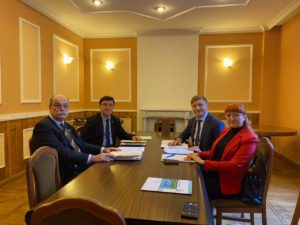On February 5, 2020, a re presentation headed by Alexander Dzheus, Director of Orlyonok Children’s Centre met with the Ministry of Foreign Affairs of the Russian Federation to discuss the important issue of visa costs for inbound children to Russian camps. During the meeting various issues were discussed with some clear successes as well as some promises of further future benefits.
presentation headed by Alexander Dzheus, Director of Orlyonok Children’s Centre met with the Ministry of Foreign Affairs of the Russian Federation to discuss the important issue of visa costs for inbound children to Russian camps. During the meeting various issues were discussed with some clear successes as well as some promises of further future benefits.
Orlyonok Children’s Centre: Invitation letters and visa procedures to enter Russia and attend programs at Orlyonok have been simplified as much as possible. Orlyonok’s international education programs are classified ‘humanitarian’ and visa fees can be lifted upon an Ambassador or Consul General decision.
Russian Federal Centres: In order for all 4 federal centres to arrange the same classification and visa relief, a new Order of the President/Government of Russia must be issued. This collective order can confirm the process for all 4 of the federal centres and exempt each centre from making a separate appeal. Further discussions are necessary to confirm the timing and implementation of this order
Other Russian camps: Because of the large number and wide diversity of camps in Russia, a similar arrangement for all becomes somewhat complicated. In order to wave Russia visa fees for international campers coming to any Russian camps (private, agency, etc.) then it requires a reciprocal agreement with the home country to permit similar arrangements for Russian children to participate in camp programs in those countries. This is a normal practice between countries and requires a good deal more negotiations.
This effort to broaden visa relief in a reciprocal way involves developing a strategy to reach our goal (visa relief for all camps) by means of additional work with ICF and National Camp Association of Russia. More consultations with the Ministry of Foreign Affairs are necessary because this is a new initiative involving both ICF and National Camp Association of Russia – neither of which are official governmental bodies.
During these discussions, the officials in the Ministry of Foreign Affairs indicated that they are ready for more dialogue. Ministry representatives also acknowledged the important role of the support letter written by ICF to seek resolution of these issues and appreciated knowing that this matter is of interest to both sides – Russian and international camp leaders. There appears to be a strong desire to address this issue.
Clearly more discussions and encouragement are necessary but the future of international camp education in Russia is a little brighter.